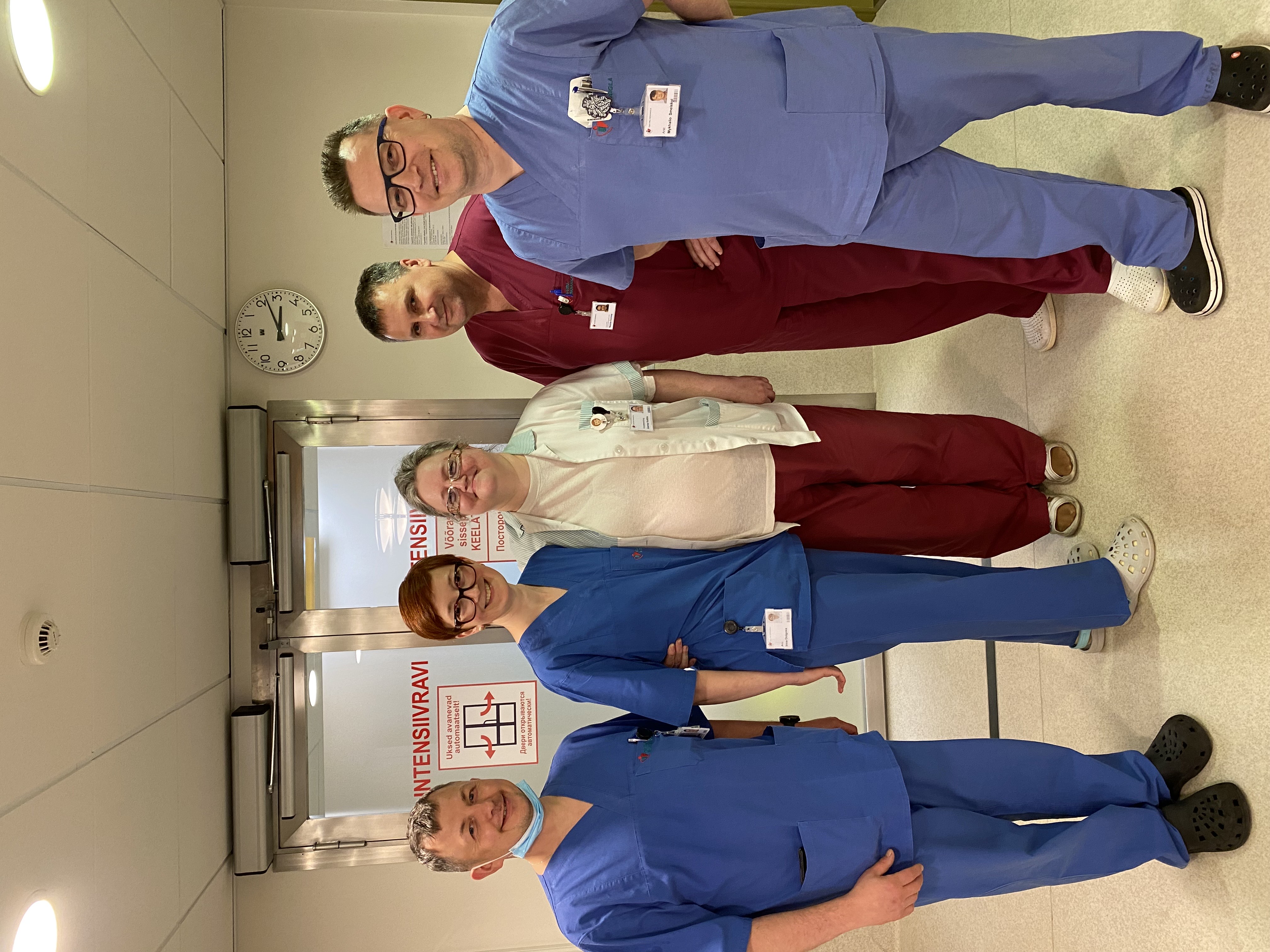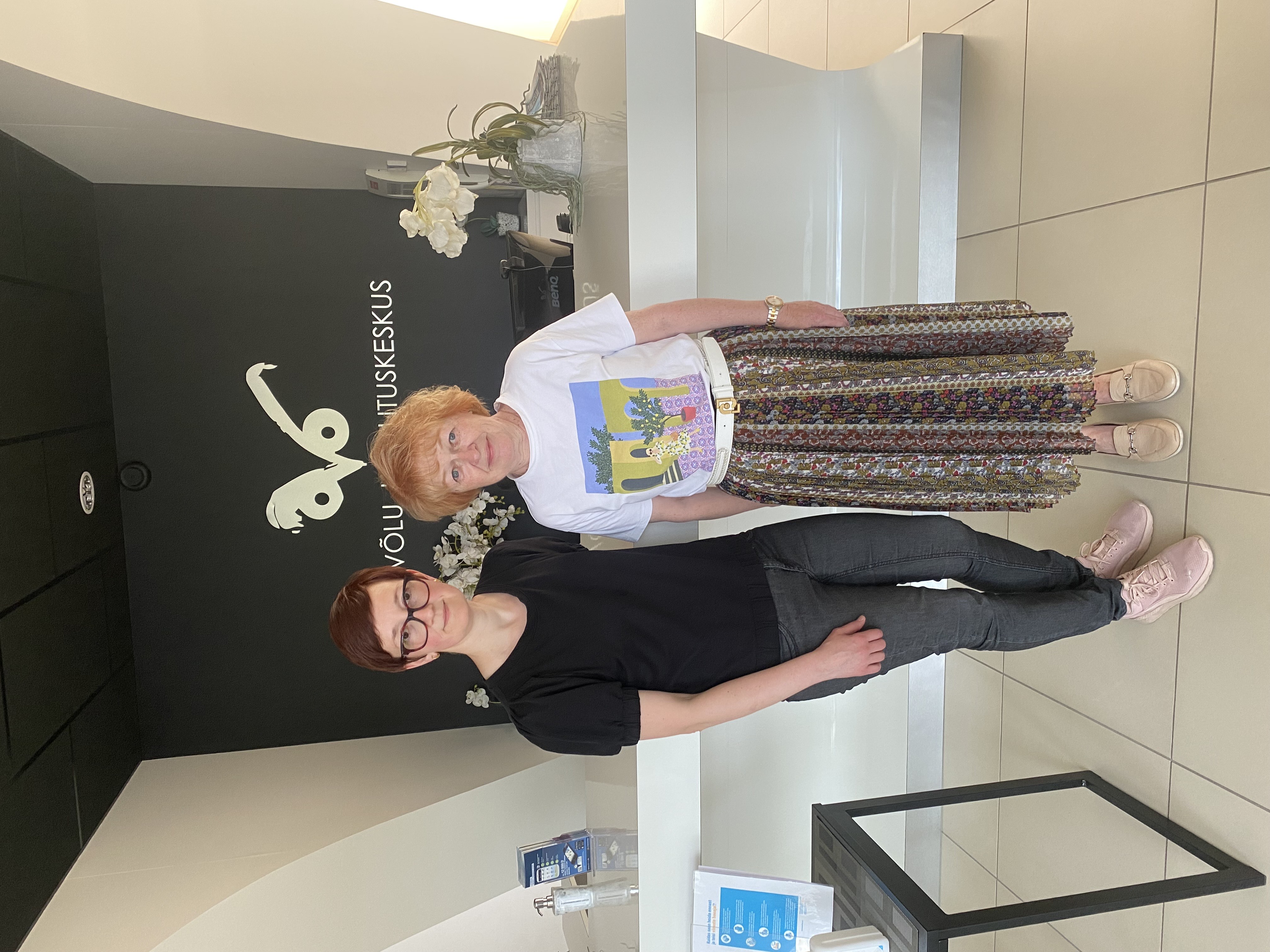Just a few months after the start of Russia’s full-scale war of conquest in Ukraine, Inna arrived in Estonia as a war refugee. Today, she speaks good Estonian and works as a doctor.
How did you arrive in Estonia and why did you decide to build a new life here?
I am a citizen of Ukraine, a Ukrainian. I worked as a doctor for 20 years in Ukraine. I finished my practice of anaesthesiology in Ukraine in 2004. For the first three years, I worked as an anaesthesiologist and intensive care physician in a multidisciplinary hospital, and from 2007 to 2022, as an intensive care physician at the Kyiv Heart Institute. I arrived in Estonia in April 2022 as a war refugee. I currently live and work in Kohtla-Järve; I work with former colleagues from Ukraine. I came here with my three-year-old daughter and my mother. At first, we came to Kohtla-Järve to visit colleagues, but now, we rent an apartment. I immediately came to Kohtla-Järve upon arriving in Estonia. My main job is at the Kohtla-Järve hospital, but a few months ago, I also started working in Tallinn.
Adapting to Estonia was not difficult because my friends live here. Several people from other countries work with me in the hospital – from Russia, Belarus, Ukraine. They help me a lot. Unfortunately, there are not many opportunities to meet Estonians here in Ida Viru County. Living here, I do not experience an entirely Estonian-speaking world.
How did you adapt to Estonia?
It did not take me long to settle in. To work as a doctor in Estonia, I had to complete an internship and then take an exam. In total, the internship lasted six months, four of which I lived in Tartu and two in Rakvere. In these cities, I could experience the Estonian-speaking world and practice the Estonian language. I work as a general practitioner in Estonia – I feel almost like an Estonian medical student who has passed the final exam at university but has not completed her residency yet. I definitely want to complete an anaesthesiology residency in Estonia as well.
English was the first thing that helped me in Estonia – it was like a bridge. After that, I started communicating in Estonian.
How did you study Estonian?
When I arrived in Estonia, a friend told me that I already knew two words – sidrun (lemon) and sibul (onion), which are similar in Ukrainian. I immediately started learning Estonian. I tried to go to Tallinn to complete an A1 level course. It was a tough commute. There were no online classes then. I learned Estonian at the A1 level independently with the help of the Tere books and the Keeleklikk programme, then started courses at the A2 level. By then, courses were already offered online. I passed the A2 level exam last year. Today, I have also passed the B2 level exam. I use the Sõnaveeb website a lot, as it helps me get a better grasp on Estonian. I am very grateful to all my Estonian language teachers – Inna Nurk, Ene Peterson, and Erika Lindsalu.
Is the Estonian language very difficult compared to Ukrainian?
Estonian belongs to a different language group than Ukrainian and all the words are new to me; very few are similar to Ukrainian, just like with English and Russian. The structure of the Estonian language is comprehensible to me. Russian is sometimes more complicated than the Estonian language. German too.
I never felt that I wanted to stop studying Estonian. My big wish was to work as a doctor, in which case language skills are absolutely necessary. That motivated me.
Do you use Estonian daily?
A lot of Russian is spoken in Ida-Virumaa. The work process is in Estonian and I communicate with other parents in my daughter’s kindergarten in Estonian. I also speak Estonian in Tallinn.
In Ida-Virumaa, we must seek out opportunities to speak and hear Estonian. My friend who came from Ukraine seven years ago sings in an Estonian choir, for example.
Have your mother and daughter also studied Estonian?
My mother only studied Estonian at the A1 level. My mother is 73 and although she has a higher education in engineering, she could not work for a long time for reasons beyond her control and started fearing everything new. A1-level courses are mandatory for residing in Estonia, and that is great. My mother participated in the Settle in Estonia adaptation programme online with a group of people of different ages and educational levels. It was wonderful to watch her study diligently and enthusiastically. The teacher was at a very good level – she encouraged the student to make an effort and speak. I am very grateful to the teacher, Svetlana Sergeeva, for supporting my mother. Currently, my mother refuses to continue studying, claiming that she is too old for that. Then again, she notes that there are many older people living in Estonia who, despite their physical limitations, remain active and take care of themselves. I think it positively affects my mother’s world view and the desire to keep up with the times.
My daughter has the opportunity to practice Estonian in kindergarten and she will soon go to a different one where she can speak more Estonian. My daughter is already 5 years old.
I have made plenty of friends at work, but unfortunately, there are not many Estonians here and I do not have many friends outside of work. I would like to communicate more in Estonian. I listen to the radio, podcasts, and search for information in Estonian. I really try my best.
I would like to have more Estonian friends. For example, the other parents at my daughter’s kindergarten are very lovely.
What would you recommend to other new arrivals?
You cannot gain language skills without effort. Languages need to be learned; they need time and work. If you want to learn, do not be afraid, the language will come to you step by step. If your language level is already at B1, we laugh more than we talk. It is not possible to communicate if a person’s language level is too low. You must try and learn. Courses, TV, radio, communicating with people – all of this is important. Language courses are good – they teach you organisation skills and motivate you; you will also be able to use textbooks. Do not be afraid!
I like Estonia very much. It is a great digital country; everything works perfectly. The people are very calm; I like that a lot. It is also good that people raise several children. It is quite normal to have three or more children in the family in Estonia. All the children are very calm and good. My child gets along well with Estonian children.


On the photos: with colleagues and supervisors at the Ida-Viru Central Hospital and with her dearest Estonian teacher Erika Lindsalu from the Kersti Võlu Language School
The Settle in Estonia Programme is a free educational programme provided by the Estonian state which is intended to help the foreigners who have arrived in Estonia to adapt and become accustomed to local life more easily. We offer courses for people who have come to live or study in Estonia and have lived here for less than 5 years. For example, war refugees to whom Estonia offers international or temporary protection, as well as people who have come to Estonia to work or do business here or relocate with their family member. We offer language training and other courses to help you cope with everyday life in Estonia. Read more and register: www.settleinestonia.ee. The adaptation programme is co-funded by the European Union and the state budget.
